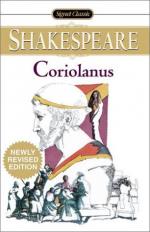|
This section contains 8,084 words (approx. 27 pages at 300 words per page) |

|
SOURCE: “Coriolanus: Body Politic and Private Parts,” in Shakespeare Quarterly, Vol. 41, No. 4, Winter, 1990, pp. 455-69.
In the following essay, Jagendorf relates the play's rhetoric of war to the fractured nature of the political body in Coriolanus, showing that the aristocratic class is associated with wholeness and fullness, compared to the fragmentation and emptiness which characterizes references to the Roman citizenry.
Political thinking and, consequently, writing about politics have traditionally made use of certain master tropes that remain constant in principle even when the nature and content of political discourse change. At the foundation of Western political thought, for instance, is the trope of the dialectical relationship between man in the state of nature (that is, man fending for himself and caring for the propagation of his species) and man in the domain of culture (that is, man in the embrace of community, of polis, of an organism that...
|
This section contains 8,084 words (approx. 27 pages at 300 words per page) |

|


